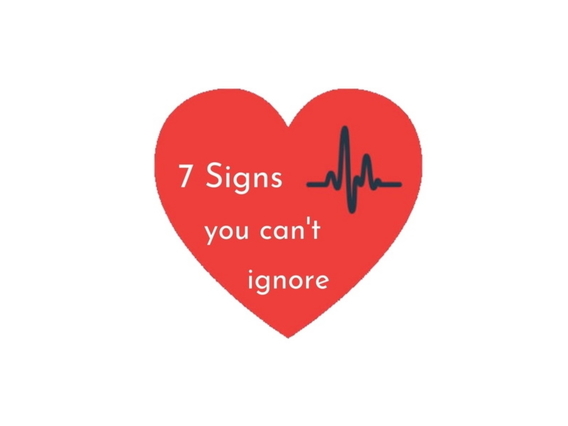
 October 26, 2020 | 10 mins read time
October 26, 2020 | 10 mins read timeYour heart is the most important part of your body. A hardworking organ that beats over 100,000 times a day, it is essential that your ‘ticker’ is ticking smoothly at all times. With heart diseases on the rise, it becomes even more important to take good care of your hardworking heart.
According to a report by the Global Burden of Diseases in 2016, India saw 1.7 million deaths out of the 17.3 million deaths around the world as a result of heart disease. These alarming statistics indicate that cardiovascular disease has plagued our country and become the leading cause of death.
Given the kind of lifestyles we live nowadays -lack of exercise, inactivity, high carb and high-fat diet, and increased stress - more caution is warranted for our cardiovascular system. This means now is the time to take better care of your heart.
Having said that, the following symptoms and conditions mean that you should go see a heart specialist right away.
If you’re experiencing one or more symptoms like chest pain and discomfort, feelings of intense indigestion or heaviness in your chest, fainting, fatigue, dizziness, difficulty swallowing, and shortness of breath, you must seek immediate intervention from a heart specialist or a cardiologist doctor, as these symptoms could indicate a cardiac event.
Some heart problems can be genetic. If you have someone in your family with cardiovascular disease, you run a higher risk of experiencing it. Consulting with a heart doctor can help in assessing your risk by studying your family history and then chalking out a care plan for you.
There are certain conditions that are associated with a higher risk of developing heart issues namely, diabetes, smoking, kidney disease, and gum disease.
Diabetes, for instance, has a strong correlation with heart disease. When blood sugar is not controlled, it can vastly affect the functioning of your blood vessels thereby significantly increasing the risk of developing coronary artery disease.
If you have a history of smoking or are a smoker, you may run a greater risk. It is one of the preventable risk factors for heart issues and cancer.
If you suffer from chronic kidney disease, you run a higher risk of heart-related issues. This is because kidney disease is tied to arterial problems and high blood pressure.
Likewise, those with gum disease may also experience heart-related issues.
Your primary physician may refer you to a heart doctor to discuss and understand your condition and manage the possible risks better.
High cholesterol and blood pressure levels are the key causes of heart problems.
Chronic high blood pressure puts increased strain on your heart to pump harder to circulate blood, thereby increasing the risk of stroke and heart attack.
High cholesterol levels can contribute to the development of plaques.
Although your physician might put you on medication to keep hypertension and lipid levels in check, you may want to consult a top heart specialist in Mumbai to look in a bit deeper.
Preeclampsia is a condition during pregnancy that is caused by a complication arising due to high blood pressure. This condition can greatly increase your risk of developing cardiovascular disease. A cardiac surgeon can intervene to keep your heart health under check.
If you are over forty, you might want to check your heart health with your doctor first before joining the gym, running a marathon, or taking up any strenuous exercises.
With the support of a heart specialist in Mumbai, you can draw up a workout plan to make sure your heart stays safe and healthy.
The blood vessels that transport oxygen-rich blood pumped by the heart to the rest of your body are known as arteries. If you have the arterial disease in the arteries of the leg or the carotid arteries (blood vessels that supply blood to the brain), then you may be suffering from coronary artery disease.
In such cases, the intervention of a heart specialist like a cardiac surgeon or cardiac electrophysiologist in mumbai is recommended.
Known for her pioneering ways, Dr. Vanita Arora is India’s first female cardiac electrophysiologist whose expertise lies in the treatment and advanced care of heartbeat irregularities like arrhythmias. With a rich medical career spanning over two decades as cardiologist in Delhi, she is currently the Director and Head of Cardiac Electrophysiology Lab and Arrhythmia Services at Max Hospital, Delhi.
Doctors who specialise in diagnosing and treating diseases related to the heart and blood vessels, which is the cardiovascular system, are known as heart specialists.
A cardiologist or a heart specialist will first understand your medical history, check your vital signs, and may perform a physical exam.
Echocardiogram (ECG or EKG), MRI, Chest X-Ray, Angiogram, Cardiogram, CT of the heart and Transesophageal Echocardiogram (TEE) are some of the tests done to measure heart function.
If someone in your family aged 55 years or less (for men) and 65 years or less (for women), has experienced chest pain, a heart attack, or a stroke, then you must visit a specialist as a preventive measure.
High blood pressure, high cholesterol and high triglyceride levels, arrhythmias, atrial afibrillation, atherosclerosis, congenital heart disease, congenital heart defects, congestive heart disease, and pericarditis are the various diseases that heart specialists treat.
Promoted by Fix Me Digitally